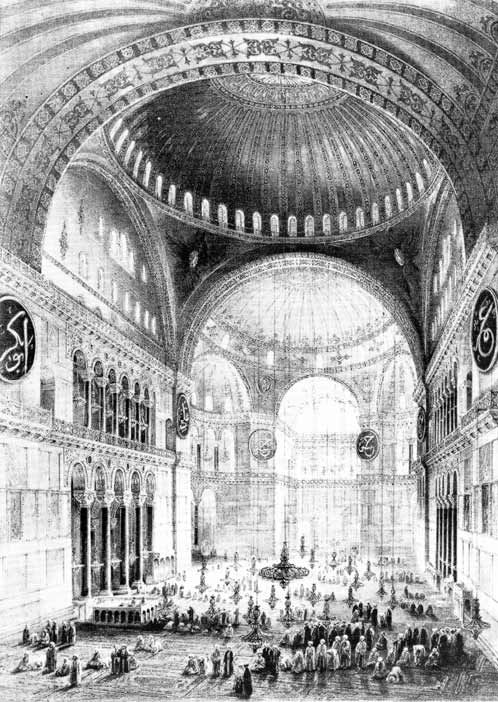|
Later in his prophetic career, Mohammed stopped asking his
followers to consult the Christians and the Jews for confirmation of
his revelations. The Jews, of Saudi Arabia, he nearly extirpated.
Nor did his early good relations with the Christians continue, and
we encounter passages like this one:
- “But for their breaking their covenant we have cursed them, and have hardened
their hearts. They shift the words of Scripture from their places, and
have forgotten part of what they were taught. Thou wilt not cease to discover
deceit on their part, except in a few of them. But forgive them, and pass
it over: verily, God loveth those who act generously!
- “And of those who say, ‘We are Christians,’ have we accepted the covenant.
But they too have forgotten a part of what they were taught; wherefore
we have stirred up enmity and hatred among them that shall last till the
day of the Resurrection; and in the end will God tell them of their doings.
- “O people of the Scriptures! now is our Apostle come to you to clear up
to you much that ye concealed of those Scriptures, and to pass over many
things. Now hath a light and a clear Book come to you from God, by which
God will guide him who shall follow after his good pleasure, to paths of
peace, and will bring them out of the darkness to the light, by his
will: and to the straight path will he guide them.”
- (Koran Sura 5:16-18).
- "And some truly are there among them who torture the Scriptures with their tongues, in order that ye may suppose it to be from the Scripture, yet it is not from the Scripture. And they say, ‘This is from God;’ yet it is not from God: and they utter a lie against God, and they know they do so."
- (Koran Sura 3:72).
|
|
Plainly now the honeymoon is over. Having been rejected as a
prophet by the Jews and the Christians, Mohammed now in his turn
rejects them. Of what are they accused? Of 'concealing' parts of
Scripture? From whom? From themselves, or from him? Mohammed
accused the Jews of Medina of concealing the Scripture, not from
themselves, but from him:
- “O Apostle! let
not those who vie with one another in speeding
to infidelity vex thee;— of those who say with
their mouths, ‘We believe,’ but whose hearts
believe not;— or of the Jews — listeners to a
lie — listeners to others — but who come not to
thee. They shift the words of the law from their
places, and say, ‘If this be brought to you,
receive it; but if this be not brought to you,
then beware of it.’”
- (Koran Sura
5:45).
|
|
As is plain in this very passage, the Jews still retain the
Scriptures, though they allegedly misled Mohammed as to their
content:
"But how shall they make thee their judge, since they possess already the Law,
in which are the behests of God, and have not obeyed it? After this, they will turn their backs; but
such are not believers. Verily, we have sent down the law (Towrat) wherein are guidance and light.
By it did the prophets who professed Islam judge the Jews; and the doctors and the teachers judged
by that portion of the Book of God, of which they were the keepers and the witnesses. Therefore,
O Jews! fear not men but fear Me; and barter not away my signs for a mean price! And whoso will not
judge by what God hath sent down — such are the Infidels."
(Koran Sura 5:47-48).
There is something more than a little unfair in this
accusation. The question of which Mosaic laws the rabbis
consider to remain in force since the destruction of the temple is a
complex one.
"Imarta the daughter of Tali, a priest, committed
adultery. Thereupon R. Hama b. Tobiah had her surrounded by faggots
and burnt. R. Joseph said: He [R. Hama] was ignorant of two laws.
He was ignorant of R. Mathna's dictum and of the following Baraitha:
And thou shalt come unto the priests, the Levites, and unto the
judge that shall be in those days: This teaches that when the
priesthood is functioning [in the Temple], the judge functions [in
respect of capital punishment]; but when the priesthood is not
functioning, the judge may not function." (Babylonian Talmud,
Sanhedrin 52b).
His Jewish preceptors were likely only trying to keep things
simple for their eager but ill-informed and ungrateful student, who in return accused them of hypocrisy and
deceit. Mohammed taught not only that the Jews possess the law, but also that the Christians possess the gospel:
- “And that the people of the Evangel may judge according to what God hath sent
down therein. And whoso will not judge by what God hath sent down —
such are the perverse.”
- (Koran Sura 5:51).
- "And whatever is in the Heavens and in the Earth is God’s! We have already
enjoined those to whom the Scriptures were given before you, and yourselves,
to fear God. But if ye become unbelievers, yet know that whatever is in
the Heavens and in the Earth is God’s: and God is Rich, Praiseworthy....O ye who believe! believe in God and his Apostle, and the Book which he
hath sent down to his Apostle, and the Book which he hath sent down aforetime.
Whoever believeth not on God and his Angels and his Books and his Apostles,
and in the last day, he verily hath erred with far gone error."
- (Koran Sura 4:130-135).
|
|
Notice that the Christians, like the Jews, are commanded to judge by
what has been sent down to them. And how are they to do that, if it is
lost, as contemporary Muslims strangely claim? And how can the faithful
"believe" in what no longer exists? They are to believe that such a
thing once existed, but no longer? Incidentally, even this seemingly
tolerant promise, that the Christians will be judged by the gospel
standard, is withdrawn in the Hadith, where we discover that, when Jesus
returns, He will judge according to the Koran!: "Narrated Abu Huraira:
Allah's Apostle said "How will you be when the son of Mary (i.e. Jesus) descends amongst you and he will judge people by the Law of the Quran and not by the law of Gospel
(Sahih al -Bukhari, Volume 4, Book 55, Number 658; Fateh-ul Bari page 304 and 305 Vol. 7).
Truly, the 'Jesus' of the Koran and the Hadith is nothing but a sock
puppet who speaks as Mohammed directs.
Mohammed accuses the Jews and Christians, who rejected his
prophetic ministry, of knowingly,— "wittingly,"—hiding the
truth: "Why wittingly hide the truth?" (Sura 3:64). Surely they
must know the truth, to be able to recognize it! According to
Mohammed ibn Abdallah, God's intent in revealing the Koran was
to give to Mohammed's people "the like" of what had been
imparted to the Christians: "that to others may be imparted the
like of what has been imparted to you." (Sura 3:66).
How does one read what was lost centuries ago?: "Moreover, the Jews say, ‘The Christians lean on nought:’ ‘On nought
lean the Jews,’ say the Christians: Yet both are readers of the
Book." (Sura 2:107). Indeed at the outset of his prophetic venture
Mohammed intended to pursue a rediscovered universal religion: "The apostle believeth in that which hath been sent down from his Lord, as do the faithful also. Each one believeth in God, and His Angels, and His Books, and His Apostles: we make no distinction between any of His Apostles."
(Sura 2:285). It became apparent even in his life-time that this would
be impossible, and the many early verses written in commendation of the
readers of prior inspired scripture became an embarrassment, leaving a
conundrum for later generations.
Mohammed's accusation against the Jews and the Christians
revolves around what they do with their tongues, not what they read with their eyes nor do
with their pens: "Among the Jews are those who displace the words
of their scriptures, and say, ‘We have heard, and we have not
obeyed. Hear thou, but as one that heareth not; and LOOK AT US;’
perplexing with their tongues, and wounding the Faith by their
revilings." (Sura 4:48). He is here accusing them of twisting the
scriptures "with their tongues," i.e., of misrepresenting the Law
in verbal disputation, not of changing the written text. He is
incidentally being more than a little unfair to the Arabian Jews in
accusing them of not following their own scriptures. After the
destruction of the temple in 70 A.D., the conundrum confronted
Jewish legal authorities of how much of the Law could or should be
observed in exile. When there is no Sanhedrin, no appellate court
for capital cases, can the death penalty lawfully be executed?
Where Jews are living under civil governments who claim a monopoly
on lethal force, is it right or prudent for a sub-population to
enforce an alien law? Inasmuch as some of Moses' laws are prefaced
with, "when ye shall come into the land," are these laws even
applicable outside the land of promise? These are difficult
questions, of which Mohammed seems to have had very little
conception.
How can a people stand upon vacant space?: "SAY: O people of the
Book! ye have no ground to stand on, until ye observe the Law and
the Evangel, and that which hath been sent down to you from your
Lord." (Sura 5:72). The people of the Book are commanded to observe the
gospel:
"But if the people of the Book believe and have the fear of God, we will
surely put away their sins from them, and will bring them into gardens
of delight: and if that they observe the law and the Evangel, and what
hath been sent down to them from their Lord, they shall surely have their
fill of good things from above them and from beneath their feet. Some there
are among them who act aright; but many of them — how evil are their doings!"
(Koran, Sura 5:70).
If they do not in fact possess the "Evangel," how can they
reasonably be expected to "observe" it? To the unlettered prophet, it was self-evident that the 'People
of the Book' possessed the book, but his modern descendants are
obliged to argue that the 'People of the Book' have no book: oops,
they dropped it, the dog ate it, they lost it, whatever. Mohammed ibn Abdallah had no such conception:
"Say ye: ‘We believe in God, and that which hath been sent down to us, and
that which hath been sent down to Abraham and Ismael and Isaac and Jacob
and the tribes: and that which hath been given to Moses and to Jesus, and
that which was given to the prophets from their Lord. No difference do
we make between any of them: and to God are we resigned (Muslims).’"
(Sura 3:78).
Modern Muslims do very much make a difference between them, and indeed there is no
alternative to so doing, inasmuch as these varied 'revelations' contradict one another and thus
cannot simultaneously be true. Which to discard? The non-conforming, most
recent one which falsely claims conformity, not the ancient one whose authenticity is conceded by all.

|


